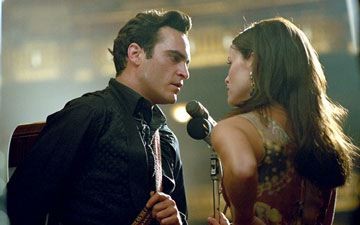Man in black

Director Sidney Lumet once lampooned the “rubber ducky” school of drama: “Someone once took his rubber ducky away from him, and that’s why he’s a deranged killer.” In telling the story of singer Johnny Cash and his tumultuous reckoning with fame—including a first marriage that crashed in divorce (though a union that produced Rosanne Cash can hardly be characterized a failure); an addiction to pills; and his courtship of June Carter of country music’s legendary Carter family—Walk the Line presents Cash’s volcanic father as the rubber ducky. Robert Patrick is directed to play Ray Cash as a walking grudge who irrationally blamed 12-year-old J. R. for a sawmill accident that claimed the life of Jack, the beloved eldest son.
From Cash’s autobiographies (1975; 1997), on which screenwriters James Mangold (also the director) and Gill Dennis based their script, there’s no question that Jack’s horrible death haunted Cash. Less clear from those memoirs—but an easier dramatic pitch for film audiences—is that Cash’s crazed drive for success was an oblique attempt to warm a father’s frostbitten heart. Throughout his life Cash spoke of his father with sympathy and respect, which the years mellowed the more. And Ray Cash was backstage and later in the audience for his son’s seminal concerts at Folsom Prison (January 13, 1968)—which you would never guess from this film.
Another thing you’d never know from this film is that Cash’s mother, Carrie, exerted on her son an influence as strong as that of his father. Mangold has Shelby Lynne play this woman as a mousy cipher, cowed by her husband’s meanness. That rings false to Cash’s chronicles and, more tellingly, to his songs, which feature wise, protective mothers (“Folsom Prison Blues,” “Don’t Take Your Guns to Town”) whose twilight summons to children playing outside that it’s “Suppertime” he transmuted into a spiritual about the Lord’s heavenly banquet. Carrie’s impact on her son persisted into 2004, with Rick Rubin’s posthumous release of Cash’s American album, My Mother’s Hymn Book.
So we come to the most disappointing aspect of Walk the Line: its inability to deal with the deep Christian piety of either John or June. The way this movie tells it, young Cash the hell-raiser was never more than nominally religious until Carter straightened him out with tough love, a copy of Gibran’s The Prophet, and one visit to the First Baptist Church. All the real-life principals—Cash included—agree that, at his nadir, he probably would have killed himself had it not been for June’s devotion to him. Nevertheless, Cash’s own Christianity was a lot more pervasively entwined in his career than Walk the Line suggests. The audience never learns, for instance:
• That Cash left Sam Phillips’s Sun Records in 1958 for Columbia not merely for more money (which he certainly got), but also for the freedom to record long-playing albums of spirituals (1959, 1961);
• That ABC-TV’s The Johnny Cash Show consistently performed gospel—including Jimmy Davis’s “I Was There When It Happened,” which in the movie nearly provokes Phillips to give Cash a swift boot;
• That the 1968 Folsom concert, arranged by Cash’s pastor, Floyd Gressett, concluded with inmate Glen Sherley’s stunning doxology “Greystone Chapel”;
• That Cash and the Tennessee Two (eventually, Three) had given prison concerts—including gospel songs—for a full decade before that epochal concert. As Walk the Line tells it, Cash first set foot in Folsom only after he got religion in 1967.
No motion picture— and not even David McCullough’s fattest biography—can tell us everything about a public figure. But by trivializing Cash’s southern Protestant spirituality, Walk the Line simplifies its unfathomably complicated protagonist, whose bouncy rhythms, onstage courtesy, gravitas and goofiness must go unexplained and are, therefore, largely omitted.
As Cash, the capable Joaquin Phoenix has the impossible task of impersonating an original while playing boilerplate—the confused, guilt-ridden young addict. As June Carter, Reese Witherspoon draws the equally unhappy assignment of playing a concept: Moral Center, vaguely religious with Appalachian sass. So charismatic is her screen presence that she not only pulls that off but manages, with Mangold’s help, to steer the audience’s sympathy away from Cash’s perpetually pregnant though otherwise neglected first wife, Vivian Liberto (Ginnifer Goodwin). Weirdly, Viv emerges as “the other woman” in this triangle.
Cash’s son (by June), John Carter Cash, is an executive producer of Walk the Line; its associate producer is the late performer’s agent, Lou Robin. That is formidable quality control. The result is a good night at the movies. The pity is that so much material was available to make it a magnificent one. Early on, Phillips tells Cash that he won’t touch gospel with a ten-foot pole. Neither will Hollywood, where devotion to God is The Love That Dare Not Speak Its Name. The line this movie walks is strewn with clichés: abused boy saved by the love of a good woman. I can’t think of a single song in Cash’s discography that corny.





